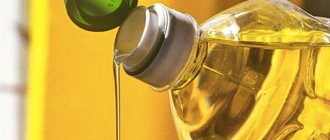This article was prepared by our beloved partners - the #GMfood - an online store of superfoods and craft eco-products.
Just for registering in the store you will receive 300 rubles to your personal bonus account and 2 more interesting gifts (Grab your gifts here)In the store's assortment you will find not only superfoods, but also healthy sweets, breakfasts, herbal teas, peanut butter, master classes for body health and facial beauty, and this is only a small part of the goodies and benefits!
Subscribe to Instagram #GMfood using this link and regularly receive new PP recipes with superfoods, see useful guides to the world of proper nutrition, and also look for gifts hidden under the link in the profile!
Health Benefits of Omega-3 and Omega-6 Acids
There are many types of vegetable oils. How can you figure out which frying oil is best?
Fats are necessary for the body to maintain normal hormonal levels, metabolism, and strengthen the immune system. If fats are excluded from the diet, the skin will begin to deteriorate, hair and nails will become brittle, and extra pounds will appear.
Vegetable oils contain useful substances such as unsaturated fatty acids Omega-3 and Omega-6.
The most popular oil that housewives use for cooking is sunflower oil. It contains up to 75% Omega-6 polyunsaturated fatty acid. It is necessary to speed up metabolism, strengthen the immune system, nervous system, and normal heart function. A person needs 6-8 grams of Omega-6 per day.
Omega-3 regulates the production of hormones in the body, promotes normal heart function, strengthens blood vessels and muscle fibers, promotes oxygen saturation of tissues, improves attention and memory. Its daily requirement is 1-3 grams.
But for them to benefit the body, the amount of Omega-6 should not exceed the number of Omega-3 by more than 6 times.
Taste qualities of oils
The taste of the oil depends not only on the quality and storage conditions of the raw materials, but also on the method of obtaining the oil. The most delicious and aromatic are unrefined oils. This is due to the high content of unsaturated fatty acids. For the same reason, they are not heat resistant and are not intended for frying.
To increase the smoke point, oils are subjected to purification (refining) and special processing (freezing, deodorizing). Such oils lose their natural taste and color. They become light and almost tasteless. But their resistance to heat increases. Such oils can already be used for frying without fear of harmful consequences.
Which oil is better for frying without harm to health?
Refined oil is suitable for frying at high temperatures. Refined oil, purified from impurities, does not mean its benefits and high quality. It is tasteless, odorless, and does not foam during frying. It has a longer shelf life and no sediment forms at the bottom. But during processing, the oil partially loses its nutritional value, the amount of vitamins decreases, but the amount of trans fats increases.
Refining is the purification of something from unnecessary impurities.
Source Wikipedia
In unrefined oil, although useful substances are preserved, it has a low combustion level. Therefore, it cannot be used when cooking over fire.
The following vegetable oils are suitable for frying and stewing foods:
- Unrefined coconut oil . Smoke point – 177 °C. You can add it to all dishes: soups, salads, desserts, drinks, fish and meat dishes;
- Refined olive . The smoke point is 242°C. Thanks to its neutral taste and smell, it can be added to baked goods, seafood dishes, soups, and fried;
- Avocado oil . It can be used for dressing salads and for heat treatment of foods. It is resistant to high temperatures. The smoke point is 271°C. Suitable for vegetable dishes, combined with seafood and poultry meat;
- Mustard oil . The smoke point is 254 °C. Can be used for baking pancakes, pancakes, for home canning, frying fish, potatoes;
- Peanut . The smoke point is 231 °C. Used for flavor and for baking;
- Refined sunflower . The smoke point is 227 °C.
Typically food is cooked at a temperature of 170 – 190 °C.
Why does oil foam when frying?
The appearance of foam during frying is a fairly common occurrence. What is the reason for its appearance?
- Using unrefined oil, it is not suitable for frying. It is recommended for dressing salads and cold sauces;
- Reuse of oil;
- The expiration date has expired;
- Water has gotten into the oil.
Cooking Tips
Frying is the most common method of heat treatment of food, in which heat from the frying pan is transferred to the food through hot oil or fat. When cooking, it is recommended to follow simple rules:
- Choosing a frying pan. The frying pan should have a thick bottom (for uniform heat distribution), a large area (to cook all the food at once) and a comfortable handle. When choosing a frying pan with a non-stick coating, you should give preference to trusted manufacturers; the destruction of this layer means the entry of a large number of toxic substances into the food.
- Choice of oil. It is necessary to use only those oils that have a high smoke point.
- Time to add oil. Oil can be added to a cold frying pan (before turning on the heat) or to an already heated one. The main thing is to place food in oil that has a temperature of more than 100 ºC. To check this, just place your palm 2-3 cm from the surface of the dish (you will feel warm) or splash a drop of water - it will “shoot”, “foam”.
- Do not use oil twice. It is strictly forbidden to use the same oil more than once, and when deep-frying - no more than 10-15 minutes. If it catches fire, smokes or darkens, you need to change the oil after washing the pan.
- Required volume. You should try to use as little oil as possible; for this it is convenient to use a spray, spray, spray or lubricate the pan with a brush.
The presented rules are necessary not only to obtain the benefits of thermally processed products, but also to eliminate any health risks associated with violation of frying technology.
Olive oil for frying
The advantage of olive oil over sunflower oil is that it contains almost no Omega-3 and Omega-6 fatty acids. It is based on monounsaturated fatty acids, including oleic acid. They are quite fluid, but during storage and cooking they oxidize less than the polyunsaturated acids of sunflower oil.
Refined oil should be used for frying. The temperature at which it reaches the smoke point, that is, when, when heated to a certain temperature, the chemical formula changes and organic compounds begin to oxidize, turning into carcinogens, is 242 degrees.
Olive oil comes in several varieties. The Extra Virgin variety is considered the highest quality. It is produced by cold first pressing from selected fruits. This oil is well suited for quick cooking. In this case, carcinogens are not formed when heated. This oil helps speed up metabolism and reduces the amount of bad cholesterol.
First Harvest oil is beneficial for the body. It is produced from the first harvest. When purchasing, you should pay attention to the date of manufacture. The fresher it is, the healthier it is.
Olive oil is suitable for frying and stewing.
A few tips on how to properly fry in olive oil
In order for oil to benefit the body, you need to know how to properly cook food with it.
- Products with a high water content will fry well over medium heat, and finely chopped foods will fry well over low heat;
- It is not recommended to use high heat for frying with olive oil, as this will kill all its beneficial properties;
- During cooking, olive oil should not be mixed with other vegetable oils, since they have different combustion temperatures. While one oil is heating up, another may already begin to burn and smoke;
- For frying, you should choose frying pans with high sides, because during the heating process the volume of oil increases;
- Oil can be reused only if it was not overheated during the first cooking.
The benefits of olive oil for the body
Olive oil is very popular due to its beneficial properties:
- It has a beneficial effect on the functioning of the gastrointestinal tract;
- Helps improve blood circulation;
- Normalizes blood pressure;
- Strengthens blood vessels;
- Improves the condition of hair, nails, skin;
- Increases the flow of bile;
- Has anti-inflammatory and antiseptic properties.
Analysis of chemical processes
When deciding on the suitability of oil for frying, it would be useful to remember chemistry.
There is such a thing as the “burning temperature (t) of cooking oil” or “smoke point”. This is the t at which oxidation of the oil occurs and the release of dangerous substances - carcinogens that can cause tumor processes. This is accompanied by burning of the oil and the release of fumes (stench). This dish is not only tasteless, but also poses a threat to the body.
How do you know which oil is best for frying? Oils with the highest combustion temperatures (from 120 to 180 °C) are considered the safest. That is, those with a higher smoke point. The smoke point is minimal for unrefined vegetable oils and cold-pressed products. Such oils are used only for salads. Refined oils and animal fats have a higher smoke point. To accurately determine this indicator, there are special tables.
Sunflower oil for frying
Refined sunflower oil begins to disintegrate and smoke at temperatures above 220 °C. Therefore, it can be used for both frying and baking in the oven.
1 tablespoon of oil contains 28% of the body's daily requirement for vitamin E.
Refined sunflower oil is very popular among housewives because it is odorless, does not foam, does not smoke, and does not splash when heated.
Its most popular brands:
- Golden seed;
- Oleyna classic;
- Sloboda;
- Gold.
Production technology and scope of rapeseed oil
This is how rapeseed grows
Rapeseed oil is produced from rapeseeds, because the oil content in such seeds is up to 50%. This oil is used in the food industry, as well as in the leather, textile, metallurgical and soap industries.
It is noteworthy that over the past few years, the volume of rapeseed oil production has increased several times, and if in 2005 2% of the world's arable land was occupied by rapeseed, then today this figure is already higher.
What is the secret of the popularity of this oil? Experts explain this by the fact that the production of rapeseed oil does not require any special financial costs. In addition, after squeezing the oil from rapeseed, the cake can be used for animal feed. In addition, rapeseed oil itself, according to scientists, is an inexpensive option for raw materials for biofuel...
However, we are most interested in how the use of this product affects the human body. Is this oil harmful to health?
In fact, until recently, rapeseed oil was not used in the food industry, and all thanks to the high content of erucic acid in its composition. Once in the human body, erucic acid is not utilized or excreted from the body, but rather accumulates. And, accumulations of erucic acid lead to a slowdown in the growth of living organisms and disruption of the functioning of internal organs and systems. However, in the 70s of the last century, Canadian scientists developed a special variety of rapeseed, the content of erucic acid was minimal - no more than 2%. This made it possible to begin using rapeseed oil both in the production of edible oil and in the production of margarine.
Today, rapeseed oil is very popular in America and Europe, its composition is balanced, and its taste is practically no different from the taste of olive oil.
So, for example, in France, the use of rapeseed oil is indicated for people suffering from atherosclerosis...
And, today, rapeseed oil ranks 3rd in global production after cottonseed and soybean oil...
Rapeseed oil was first produced in ancient India, and that was a long, long time ago. A plant such as rapeseed was cultivated there back in the 4th century BC. Today, rapeseed oil is produced on an industrial scale by pressing or extraction, followed by processing of the raw materials. It is noteworthy that
For food purposes, only unrefined oil of the first grade and refined rapeseed oil of a non-deodorized grade are intended.
As for the composition, the type of oil allowed for human consumption is one in which the content of erucic acid does not exceed 5% (but the lower the content of such erucic acid, the better!), and the content of thioglucosyls is no more than 3%.
Coconut oil for frying
Both refined and unrefined oil are suitable for frying. But unrefined coconut oil is considered the healthiest. It has a faint odor and taste of coconut. Its natural sweetness complements the taste of baked goods and fried chicken.
For frying potatoes and fish, it is better to choose refined oil, which is odorless and tasteless.
Benefits of coconut oil
Coconut oil has a number of beneficial properties:
- Has bactericidal properties. Can be used as a mouth rinse for stomatitis;
- Promotes weight loss;
- Thanks to the lauric acid it contains, it helps increase good cholesterol;
- Prevents the risk of developing heart disease.
Avocado oil for frying, its beneficial properties
Unrefined oil has a slight nutty taste. In addition, it has a lot of useful properties:
- Reduces bad cholesterol;
- Fights inflammatory processes;
- Helps lower blood pressure;
- Improves vision.
Avocado oil is suitable for frying and grilling. It can be added to salads, smoothies, and cold dishes.
But its main disadvantage is the high price.
Smoke point for different species: table
| Product | Smoke point |
| Olive (pomace) refined | 238 |
| Sunflower refined | 232 |
| Ghee (or ghee) | 252 |
| Coconut food | 232 |
| Olive (extra virgin) | 200 |
| Organic (natural fat) | 205 |
| Avocado oil | 270 |
| Peanut refined | 232 |
| Peanut unrefined | 160 |
| Grapeseed oil | 216 |
| Hemp | 165 |
| Corn refined | 232 |
| Sesame semi-refined | 232 |
| Palm semi-refined | 232 |
| Soybean refined | 238 |
| Margarine | 182 |
Corn oil for frying: benefits and harms
The boiling point is 180 degrees. For frying, refined oil, purified from various impurities, is better suited.
You can fry fish, meat, vegetables, and French fries on it. It can be used to prepare gravies, salad dressings, homemade mayonnaise, and baked goods. It is suitable for stewing and preparing various deep-fried dishes.
When heated, it does not form carcinogens, does not foam and does not burn. It is used for preparing baby food and dietary dishes.
Although its calorie content is quite high - 899 kcal, it is easily absorbed by the body. Its regular use helps to normalize metabolic processes, improve the functioning of the gastrointestinal tract and liver. This is a fairly effective choleretic agent.
How to store it correctly
Everyone knows that oil cannot be stored once used. A used product, which has already received a good dose of carcinogens, becomes outright poison when reused. Therefore, even if it remains after frying, you need to get rid of it without pity.
Purchased oil should be kept in a tightly sealed container, otherwise the product will go rancid. Moreover, the container can be plastic or glass, but in no case metal.
Bottles with the product should be placed in a dark cabinet so that it is not disturbed by the sun's rays. Another condition for good preservation is coolness. The average temperature of the place where the vegetable oil should be located is from 5 to 20 degrees Celsius.
It does not like changing storage locations with different temperatures. Therefore, if the oil is put in the refrigerator, it should be kept there. If this bottle is then moved to a shelf in the kitchen cabinet, you can forget about the quality of the product.
Organic foods should be refrigerated if they are used regularly. If fat is purchased for a long term, it belongs in the freezer.
What to do to prevent oil from splashing when frying in a frying pan
- To prevent oil from splashing when frying, the most well-known method is to add a little salt to a dry frying pan before adding oil.
- Make sure the pan is dry before frying. To be safe, you can wipe it with napkins.
- To prevent the oil from splashing in all directions when frying pasties, cutlets, and fish, you can add a piece of butter to the vegetable oil.
- For greater effect, you can cover the frying pan with a special mesh screen to prevent splashes of hot oil.
Refined or unrefined oil is better for frying
Unrefined oil is used for preparing salads and cold dishes. When exposed to high temperatures, carcinogens are formed in it.
Refined sunflower and olive oils are suitable for cooking at high temperatures. During the refining process, various impurities and water are removed from it. As a result, the oil's resistance to oxidation increases. This does not affect the energy value of the product in any way.
For deep frying, it is recommended to use refined olive oil. It has a high content of Omega-9 acids, so it is resistant to oxidation when exposed to high temperatures.
Rating of quality unrefined products
Refined oil, of course, is super, but some recipes require the use of more aromatic products, which, in addition to everything, are very tasty and healthy. In any case, this oil has much more advantages in salads and dressings. As for the choice, reviews will come to the rescue here, as well as independent testing in the laboratory of Roskontrol.
VIVID Extra Virgin cold pressed
Anyone who thinks that cold pressing is used exclusively for processing olives is mistaken. This product from sunflower seeds was obtained using this method, which simply by definition could not but affect the price, which exceeded 200 rubles. However, the oil is worth it, being not only safer and healthier, but also very rich and tasty.
good taste, color and aroma, making the product suitable for dressing salads and sauces;
useful composition (recommended by Yulia Vysotskaya);
declared cheese-pressed processing technology.
some buyers note the weak aroma and taste of the oil, which supposedly differs little from refined analogues;
limited availability - finding oil in ordinary non-specialized stores is not so easy;
price.
Russka raw pressed sunflower oil
Another item obtained using the ExtraVirgin technology, which will cost potential buyers 135 rubles, which is much cheaper than in the previous case.
At the same time, the manufacturer managed to preserve all the useful qualities of the product, since only one filter is used during raw material processing.
excellent taste and aroma, making ready-made dishes only richer;
high content of E (12 times higher than in olive oil) and other vitamins in the composition;
Convenient compact glass containers that allow you to preserve the beneficial qualities of the product for a long time.
some users complain about the faint odor of the oil, suspecting that it is only partly made from cheese;
high cost, considering that the volume of oil in the bottle does not exceed 250 ml.
"Sloboda"
Completely natural and completely safe oil, suitable for preparing dishes for the whole family. “Aromatic” - the name of the product fully corresponds to its organoleptic qualities, while the average price tag is 120 rubles. makes it quite affordable for buyers with different budgets.
Roskontrol also agrees with this verdict, whose reports indicate full compliance with GOST, as well as with the declared highest grade. The only criticism was caused by incorrect labeling data on the content of healthy fats and vitamin E.
a good aromatic oil, suitable for both frying hot dishes and seasoning cold and warm snacks;
affordable price and plastic containers that are not afraid of breaking.
weakly expressed taste and aroma of products;
the smell worsens when frying fish and other foods with a specific smell.
"Russian"
Quite tasty, safe and meeting all current standards, the oil has been tested by an independent expert. And if you do not take into account some little things like exceeding the acid number, then this oil definitely deserves to be purchased and tried.
is not inferior in quality to its more expensive analogue;
does not foam and copes well with its everyday tasks;
price tag
first grade, instead of the highest grade indicated in the labeling;
the product is not as aromatic as other full-fledged cold-pressed analogues;
Not the most convenient plastic container for a volume of 1.7 liters.
Customer Reviews
What oil is better for frying, according to people?
Feedback on the forum
Feedback on the forum
Feedback on the forum
Feedback on the forum
Feedback on the forum
Feedback on the forum
Reviews are very different. How many people, so many opinions.











